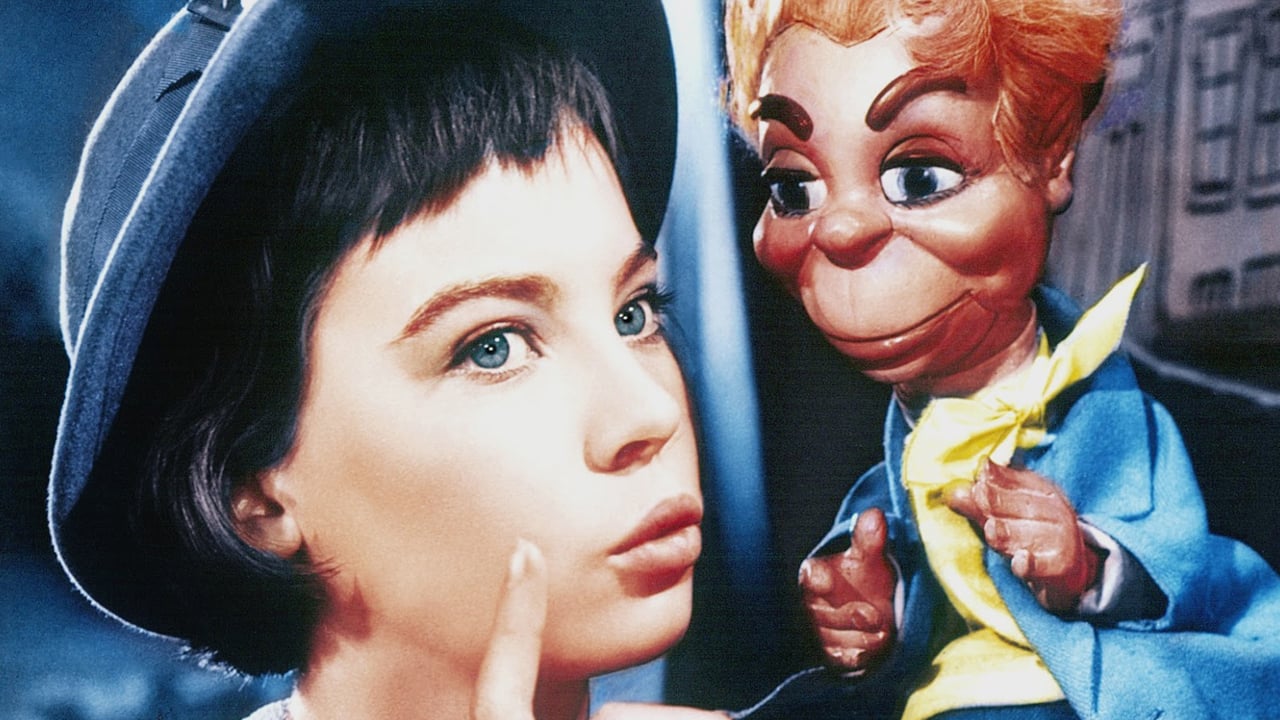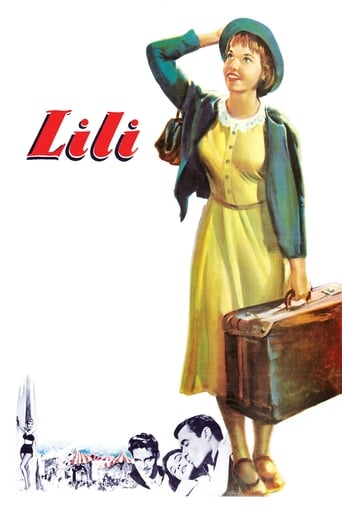



What a beautiful movie!
Crappy film
While it doesn't offer any answers, it both thrills and makes you think.
View Morewhat a terribly boring film. I'm sorry but this is absolutely not deserving of best picture and will be forgotten quickly. Entertaining and engaging cinema? No. Nothing performances with flat faces and mistaking silence for subtlety.
View MoreSpoilers. Observations. Opinions. Charming film. The haughty little French girl loved by two men in An American in Paris is now an orphan, waif, naive and homeless. Leslie Caron plays the innocent well, here. She pulls it off. She also pulls off a fantasy sequence in which she is more adult such as wearing the slinky red dress. Another more adult fantasy sequence had her dressed in a short red dress in which she served imaginary food and drinks to imaginary bistro clientele. It was common for 1953 era women to aspire to be "waitresses". That sexist term had been replaced by "server". Today, many more women are educated to acquire professional careers, not to schlep hash and suds in a saloon. There were too many pink dress waitresses in this film. Paul, the former dancer, was injured "in the war". I assume that that meant World War Two, which ended in 1945 -- eight years before this 1953 story took place. War was still being mentioned in 1950s films. France was greatly damaged in that war. People were devastated. Here, people make the best things and decide to attend a carnival and enjoy themselves. This fun show is truly a ray of sunshine in their formerly dreary lives. The puppets are adorable, and are exciting to watch when they come to life in the fantasy "walk down the yellow brick road" dance scene near the end. Caron is a great dancer, but I don't see enough of that here. In the down the road fantasy, Paul (Ferrer) dances very well and quite sensually. He is no longer the angry man with the limp. I am a degreed historian, actress, singer, dancer, film critic and movie reviewer.
View MoreThis delightful little musical romance drama was directed by Charles Waters and features a screenplay by Helen Deutsch from a story by Paul Gallico. It stars Leslie Caron in the title role; she sings the catchy song "Hi-Lilli. Hi-Lo" which was written by Deutsch and Bronislau Kaper, who won his only Academy Award for writing its Score. Caron earned the first of her two unrewarded Best Actress Oscar nominations. Waters and Deutsch received their only Academy recognition with Best Director and Screenplay Oscar nominations, respectively. Color Cinematographer Robert Planck earned the last of his four unrewarded nominations. The cast also includes Mel Ferrer, Jean Pierre Aumont, Zsa Zsa Gabor, and Kurt Kasznar (among others), and four puppets (given life and voices ostensibly from Ferrer, and Kasznar).Lili Daurier (Caron) is a sweet, innocent recently orphaned (when her father died) French girl of sixteen who's traveled to a coastal town in hopes of finding work, and a home, with a baker friend of her deceased father. Unfortunately, he too had died recently; she learns from the proprietor of an adjacent store (Alex Gerry) who's about to take advantage of her until another man prevents it. That man turns out to be Marcus the Magnificent (Aumont), a magician with the circus troupe that's in town. Like a little duck, Lili follows Marc, meeting two of his fellow performers, puppeteers actually, Paul Berthalet (Ferrer) and Jacquot (Kasznar).Marc quickly learns how naive and ignorant in the ways of the world (and of being a woman) Lili is, but he doesn't take advantage of her. Instead, he convinces a cabaret manager (Ralph Dumke) to hire her. But Lili loses the job after one night because she can't handle being a waitress very well, especially when she watches, love- struck, as Marc performs his show with his assistant Rosalie (Gabor).Upon being fired, Lili goes to Marc hoping he'll help her again but, fed up with her cramping his style, he tells her to grow up and go back to the original store owner who'd tried to take advantage of her. Downtrodden with nowhere to go, she puts down her things and begins to climb a high-wire ladder to commit suicide when one of the puppets talks to her.Of course, the puppets are being controlled by Paul, who had seen what Lili was about to do and decided to save her. Paul had been a great, famous dancer but is now lame; he now finds that the most comfortable way for him to perform for an audience is by hiding behind a curtain. It has become virtually the only way in which he deals with others at all, at least pleasantly. Paul's puppets interact with Lili, singing the aforementioned song with her, and she laughs and forgets her troubles. The show is witnessed by other performers in the troupe who were entranced by it.Paul and his assistant Jacquot, who only moves some of the puppets while Paul provides all the voices, decide to ask Lili to join their act. Each evening, Lili dresses in her same simple dress and interacts with the puppets as if they were real people. It's her innocence which enables her to accept the four characters are being real, which comes across to the audience and causes the act to become such a success that it's recognized by some Paris agents (Wilton Graff and George Baxter).Paul, who's the improvisational genius of the nightly performances, has fallen in love with Lili. But, alas, Lili's heart still belongs to Marc. She even dreams of him (there is a dance sequence featuring Lili "stealing" Marc away from Rosalie). She buys a new dress, making herself look all grown up, and approaches the magician's trailer. Having just learned that his act is being hired by a Paris hotel, he's not as altruistic nor noble towards Lili.In fact, Marc goes with her to her trailer, which she shares with Paul and Jacquot, but before anything can happen, they're interrupted by Paul's return. Naturally, Paul is heartbroken once more; he even slaps Lili when she runs after Marc to return something he'd dropped. Later, Lili realizes that what Marc had left in the trailer was his wedding ring, and that he's really married to Rosalie - a fact the duo had purposely kept secret for business purposes (e.g. Marc attracts a large female, paying audience).Lili returns the ring to Marc and begins to leave altogether, but again the puppets bring her back (and not just because Paul needs her for the act before it too can go to Paris). Suddenly, she draws back the curtain to reveal Paul who, in the film's most powerful scene, tells her why the puppets' characterizations are so real and heartfelt - each is a reflection of a different part of his own personality, which he's too afraid to reveal on a person-to-person (human) level:I am Carrot Top: confident, clever, capable of running his life and yours, and everybody else's; and I'm Golo the Giant: cowardly, stupid, longing to be loved, clumsy and in need of comforting; and I'm Marguerite too: vain, jealous, obsessed with self, looking at my face in the mirror - are my teeth nice? Is my hair growing thin? And I'm Reynaldo: the thief, the opportunist, full of compromise and lies like any other man. I have in me all these things.But remembering his slap, Lili leaves anyway only to return (after another imagined sequence in which the puppets are people-size, each dancing with her before one-by-one they become Paul and walk back towards where she's been) to Paul in the end.
View MoreThis is a cute little movie, and a sweet love story. Leslie Caron is very likable as a naive 16-year-old all alone in the world, who is taken in by a traveling carnival company. Mel Ferrer is the brooding puppeteer who only expresses his true feelings through his alter-ego hand puppets.Acclaimed in its day and still well-loved by many, LILI (1953) nevertheless feels like the obscure film it has become. There are elements of the story that would play best in the minds of children, such as accepting that a 16-year-old would forget that puppets aren't living personalities. (Not to mention any issues of grown men longing after teenage girls.) Personally, it's just not my "style", I suppose. (The puppets are... I don't want to say "creepy", but...) The whole thing is wrapped in a sort of hokey childlike innocence that doesn't really work for my jaded adult mind. It's alright as a curiosity and Caron is great in an early dream sequence (with Zsa Zsa Gabor).
View MoreLeslie Caron is so sweet and vulnerable here. That seemed to have been a trademark for the star who earned an Oscar nomination here.An orphaned waif who is stranded in a town she was sent to soon finds her way to a carnival. There she meets Jean Pierre Aumont, the magician who is secretly married to Zsa Zsa Gabor. In her brief appearance, Gabor is as cunning as ever.There is also puppeteer Mel Ferrer, a dancer whose career ended with an injury he sustained during the war. At first, Lili ignores him and he expresses his true desire for her through the puppets.I will say that the ending dance sequence was memorable, but the film itself is routine with a really unremarkable Caron displaying innocent saccharine like tendencies.
View More